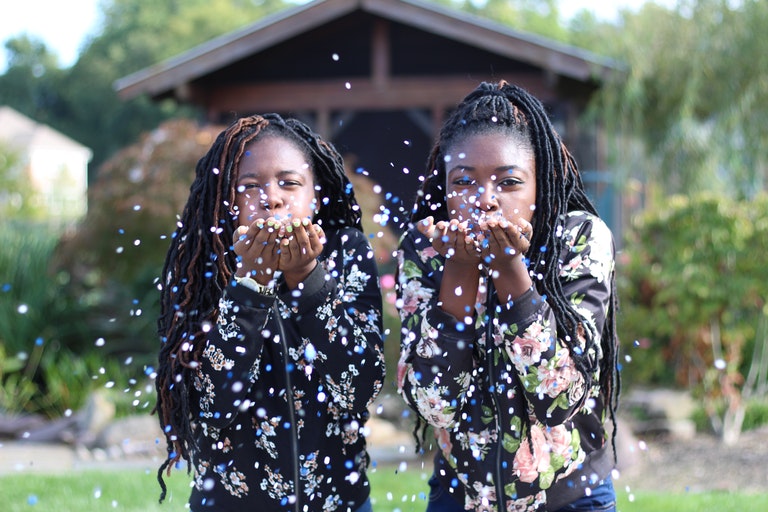Don’t we all hope to raise confident kids, ready to head out into the world with high self-esteem? We want them to maintain their sense of worth through life’s ups and downs, appreciate who God is ever-creating them to be, have the courage to face challenges and enough hope to go after opportunities. How do parents do this?

Now, of course, there are several ways to raise confident kids with high self-esteem. One of the most essential to all others is the way we think about children’s efforts and associated outcomes. Many of us watch children and focus on whether or not the outcome was “good” or “bad.” Perhaps there’s another, more helpful lens through which we can see our children’s lives.
Raising Confident Kids Using Descriptive Praise
Evaluative praise makes value judgments, categorizing actions, people, outcomes, experiences as either “good” or “bad.” Descriptive praise, on the other hand, focuses very simply describes what a child has done, letting it be valuable in and of itself beyond the construct of what we, the adult observers, have deemed worthy.
Why is this an important distinction? By describing what a child has done, the focus remains on them. Our words highlight their work, their effort, their feelings, their experience. Rather than focusing on whether or not the energy they invested led to a “success,” parents focus on the process of completing the task, regardless of the outcome. Children then more easily trust themselves, find more value in the work they do and feel less need for others’ approval as they do the delicate work of developing their sense of self. The following are various ways of implementing this principle.

Celebrating Victories and Failures
Recently I read a story about a woman whose father celebrated her failures even more so than her successes. When confident kids take risks and rise to the challenges in their lives, they often fail. If we all continued to do the easy thing, we’d never fail. Also, statistically children who receive wild praise for their successes alone are more prone to avoid trying new things. This is because the likelihood of continuing to receive that praise goes down every time. So, when a child fails instead of saying, “Aw, bummer. Don’t worry, you’ll do better next time,” try saying “You tried something new! It takes such courage to do that!”
Noticing Their Experience
So often we tend to make our evaluation and experience the focus of an interaction with children. Our agenda, if we’re honest, is what we take most seriously almost always. So, to instead notice and vocalize a child’s experience takes some practice getting outside of ourselves. For example, instead of saying “If you keep whining about this, I’m gonna lose it!” try “I can tell you’re upset. Take a deep breath, use a clear voice and tell me what you need, so I can help you.” Confident kids take seriously their own experience and have developed the ability to express it.

Making it a Point to Highlight Effort
Generally, we focus on the outcomes of our children’s work. This is the way, after all, that almost all of us were parented. Instead, make it a priority to speak to children about the effort that they put into their work. For example, rather than “Wow! What a beautiful drawing!” try saying “Oh, my, I can tell you used a lot of concentration to include all that detail.” Confident kids are less concerned with another person’s perception and more interested in their own effort.
Being Specific About Observations
Children can tell when we’re sincere. And in order to be sincere in our praise we must take the time to notice them. Yes, I know, they’ve shown you that thing they learned upwards of 1,000 times. But, in spite of the fact that you’d like to simply say “Good job!” when they play you the song on their recorder AGAIN try saying “Gosh, what patience it’s taken to learn that. I can see how much smoother your fingers are moving to cover the holes.” Confident kids value their own specific point on the journey even when they realize how far they have to go.
Asking for More Information
We tend to enjoy another person investing time to ask about our lives and creations. Children are no different. So, when a child tells or shows you something they’ve done or created, ask them for more information about it. Instead of offering them the standard “Oh, cool.” response try asking them about it. For example, “Tell me more about how you learned all those lines for the play.” or “How does it feel to have gotten a higher score on your chapter test?” or “I see you have a new outfit on. What do you like best about it?” Confident kids value their unique way of moving through the world because the adults in their lives have cared enough to be curious.

The Goal
Children’s internal voices mirror the words of those to whom they’re primarily attached. This means that what they hear from you is what they will begin to hear from themselves as internal monologue. Consequently, our words to children are deeply valuable, and we must strive to speak to them in love as God would.
God unfailingly, through grace, ever sees each of us in the light of our potential. And being aware of the complexity of our existence, God certainly doesn’t reduce our actions to either “good” or “bad.” So, why shall we when observing our children? Take seriously your role, because your words will not only become a child’s internal voice but also the voice they project upon their concept of the Divine.
The goal is to encourage our children to look internally for their worth, having learned to hear the still small voice of encouragement, teaching, and advocacy of the Holy Spirit. Confident kids tend to trust their experience, know realistically what their abilities are, avoid the ups and downs of constantly trying to please others, find value and pleasure in a process regardless of the outcome, pursue opportunities, and take healthy risks. All of this contributes to a child’s self-image, self-esteem, and resilience. As they develop within such rich soil, confident kids can grow into present, brave, and humble humans.
As you practice this new skill, in the same way that you’re coaching your children, focus on the process. Be gracious to yourself. It’s a big shift that runs up against deeply-ingrained patterns of communication. And the more attention you pay to your effort than to the outcome, the easier it will become to do so with the children in your life.
We love hearing from you and want to know how descriptive praise has made a difference for your ministry and family. So, don’t forget to share in the comments below!


Leave a Reply